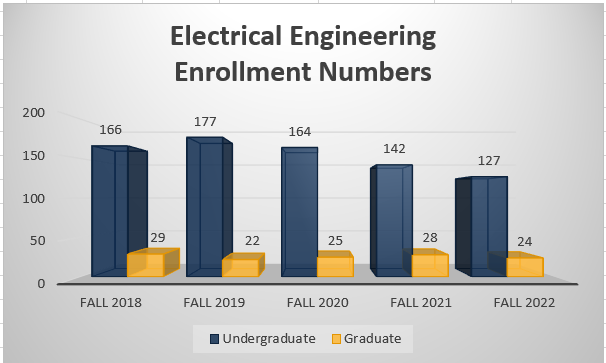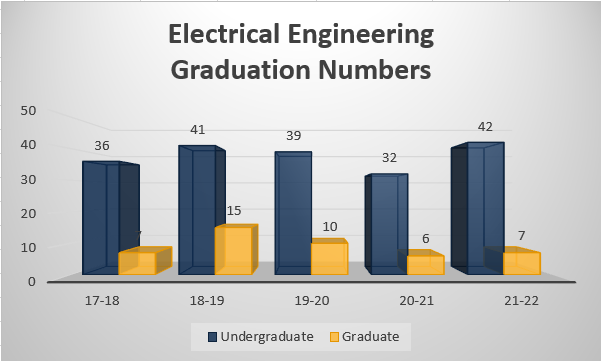Electrical Engineering ABET Information
Our Mission
To educate Electrical Engineering students for professional practice or further study, to contribute to the body of knowledge in Electrical Engineering education, and to create a supportive environment that enables students and faculty to achieve their best.
Our Program Objectives
The Electrical Engineering (EE) Department offers an undergraduate B.S.E.E. degree and a graduate M.S. degree. Strengths of the program include significant student-faculty interaction, strong engagement with local industry, and a hands-on laboratory focus. Total enrollment in the department now exceeds 140 students.
The Program Educational Objectives (PEOs) of the electrical engineering program state that electrical engineering graduates will:
- Achieve success within the electrical engineering profession.
- Remain intellectually curious, seeking professional development through continuing education and/or advanced degrees.
- Be effective and positively contributing members within their professional, local, and global societies.
Student Outcomes
The student outcomes (SOs) that the students in the Electrical Engineering (EE) Department at The University of Tennessee at Chattanooga are enabled to attain are:
(1) An ability to identify, formulate, and solve complex engineering problems by applying principles of engineering, science, and mathematics.
(2) An ability to apply engineering design to produce solutions that meet specified needs with consideration of public health, safety, and welfare, as well as global, cultural, social, environmental, and economic factors.
(3) An ability to communicate effectively with a range of audiences.
(4) An ability to recognize ethical and professional responsibilities in engineering situations and make informed judgments, which must consider the impact of engineering solutions in global, economic, environmental, and societal contexts.
(5) An ability to function effectively on a team whose members together provide leadership, create a collaborative and inclusive environment, establish goals, plan tasks, and meet objectives.
(6) An ability to develop and conduct appropriate experimentation, analyze and interpret data, and use engineering judgment to draw conclusions.
(7) An ability to acquire and apply new knowledge as needed, using appropriate learning strategies.
Annual Student Enrollment and Graduation Data
Enrollment Data

Graduation Data
